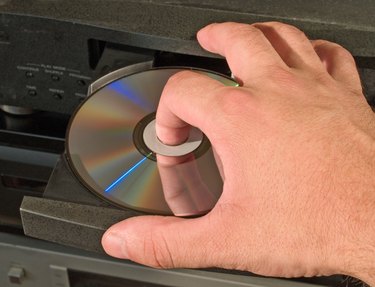
Although DVD players may look like their CD-playing cousins, they're run on a very different kind of optical technology. And thanks to the audio and video demands of movies, they're also more complicated to set up.
Step 1
Check audio connections to make sure they're secure.
Video of the Day
Step 2
Replace the cable connecting the DVD unit to your receiver.
Step 3
Clean the contacts on the player and receiver with electronics-grade contact cleaner.
Step 4
Make sure DVD is clean and unscratched.
Step 5
DVDs can be cleaned in the same way that CDs can, but they are more fragile and more sensitive to scratches than CDs are (see How to Restore a CD).
Step 6
Check that disc is loaded the correct way.
Step 7
Check that disc is encoded for your geographical region. A disc from Europe (Region 2) will not play in a North American (Region 1) player.
Step 8
Turn off player with disc inserted, unplug temporarily from wall outlet, plug back in and turn back on.
Step 9
If your player has a transportation lock (usually a plastic screw on the bottom of the unit), make sure that it is not engaged.
Step 10
If you have an older player, check with the manufacturer to see whether an update to the firmware is available. Many newer DVD titles with lots of special features are famous for causing problems on older players.
Step 11
Movies playing with subtitles on. Go to disc's menu and turn off subtitles. Some players will let you turn off subtitles by pressing the Subtitle button on the remote and then pressing 0 or clear.
Step 12
Squished picture. Check player's setup menu to make sure it's not set for a wide-screen TV if you don't have one.
Step 13
CD-R disc not recognized after loading. Most DVD players can't read CD-R discs, even if they can play normal CDs.
Step 14
Picture quality alternates between light and dark. This is caused by Macrovision copy-protection scheme if you copy DVD video to VCR or if you hook up DVD to TV by way of VCR.
Video of the Day